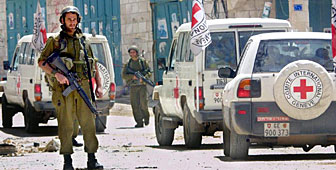ICRC announces massive aid increase for Palestinians

The International Committee of the Red Cross has launched a massive increase in aid and staffing for the occupied Palestinian territories.
At a press conference in Geneva, the ICRC’s head of operations for the Middle East and North Africa, Werner Kaspar, said the humanitarian organisation’s budget for Israel and the occupied and autonomous territories was being doubled from SFr35 million to SFr79 million.
This unprecedented increase in funding depends on the generosity of the ICRC’s donors. Only 30 per cent of the original budget has so far been met, meaning that SFr68 million still needs to be found.
Extra staffing
The money will be spent on new or expanded programmes for the civilian population in rural and urban areas. Staff will be increased accordingly – the number of expatriate ICRC workers will rise from 50 to 100, and local staff from 110 to 170.
Existing food-relief programmes for West Bank villages will be expanded to cover 30,000 families, rather than the existing 10,000, while aid will be increased for 20,000 of the most vulnerable families in nine West Bank towns.
Support will be stepped up for the Palestine Red Crescent’s emergency medical service, while Israel’s humanitarian organisation, Magen David Adom, will receive 20,000 bags of blood for transfusions.
The ICRC said its new activities were part of its efforts to ensure a “faithful implementation of international humanitarian law, in particular the Fourth Geneva Convention”. This document lays down rules for the protection of civilians during wartime or military occupation.
Collapse of society
The ICRC said Israeli military incursions, prolonged closures and curfews, and the destruction of public infrastructure and private property had led to the collapse of Palestinian society.
“Recent developments in the West Bank have led to a breakdown of the local economy, which has had an impact on the civilian population,” Kaspar told swissinfo. Existing ICRC programmes, he said, were no longer sufficient to meet the needs of the people.
He said that many West Bank villages were lacking basic foodstuffs. Their inhabitants were often prevented from going to the bigger towns to look for food by curfews. For that reason, the ICRC is planning to bring 12,000 tonnes of food into over 200 villages.
Stocks were depleted, too, in urban areas, Kaspar added, though food was available. However, tens of thousands of Palestinian families were now too poor to afford it.
“We have come up with a new voucher programme which will benefit around 120,000 individuals,” Kaspar said.
Much of this extra aid is being kept in warehouses in the Jordanian capital, Amman. Currently, five lorries loaded with humanitarian assistance are crossing into the Palestinian territories every day. This will increase to at least 12.
Fragile situation
Kaspar said Israel’s civilian and military authorities had promised to facilitate the implementation of the ICRC’s work. However, he acknowledged that this was heavily dependent on events on the ground.
“The situation changes. It is fragile and will remain so. But as recent events show, even in the worst situations we have been able to do something,” he says.
Kaspar said levels of aid for the region would not remain as high into next year: “It is not sustainable for the ICRC. We will have to scale down and put the responsibility on the Israeli interlocutors, the Palestinian interlocutors and other international agencies”.
“These are emergency measures, however, and we expect other mechanisms to take over as soon as possible,” he added, pointing out that existing programmes – such as visits to detainees, support for hospitals, aid to homeless civilians and raising awareness about unexploded ordinance – would continue.
by Roy Probert

In compliance with the JTI standards
More: SWI swissinfo.ch certified by the Journalism Trust Initiative
You can find an overview of ongoing debates with our journalists here . Please join us!
If you want to start a conversation about a topic raised in this article or want to report factual errors, email us at english@swissinfo.ch.